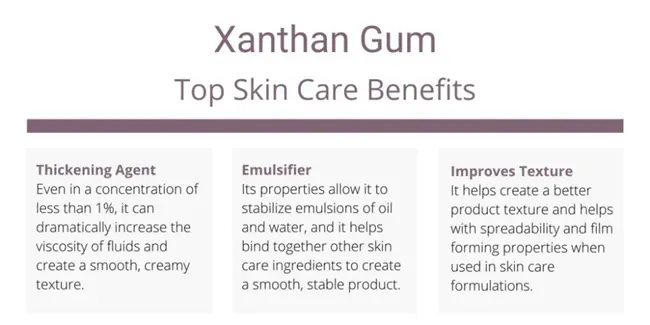Is Xanthan Gum Safe For Skin?
2024-08-20 17:54:14
When it comes to skincare products, the ingredient list can sometimes feel like a foreign language. Among the many ingredients, xanthan gum powder often pops up, especially in moisturizers, serums, and even some cosmetic products. If you’ve ever wondered about the safety and benefits of xanthan gum for your skin, you’re in the right place. In this blog, we'll dive into what xanthan gum is, how it interacts with your skin, and whether it's a good addition to your skincare routine.
What is Xanthan Gum?
Xanthan gum is a flexible polysaccharide, a sort of starch comprised of various sugar particles connected together. It is eminent for its capacity to go about as a thickening and balancing out specialist in a heap of items, going from food to beauty care products and drugs. A fascinating biological process is involved in the production of xanthan gum: it is delivered through the aging of straightforward sugars by the bacterium Xanthomonas campestris. This maturation cycle brings about a gel-like substance that, when dried and powdered, can be rehydrated to grant thickness and dependability to different details.
Xanthan gum plays tracked down a critical part in the domain of skincare and beauty care products. Xanthan gum is used to improve the consistency and texture of creams, lotions, and serums, making them smooth and simple to apply. It aids in the stabilization of emulsions by preventing the oil- and water-based components from segregating, which is essential for the effectiveness and longevity of numerous cosmetic products. Additionally, its use in toothpaste and shampoo ensures that the product maintains a consistent consistency throughout its use thanks to this stabilization property.
Generally speaking, xanthan gum is a striking fixing that shows the force of normal maturation processes tackled for current applications. Its significance in both everyday consumer goods and specialized industrial applications is highlighted by its capacity to enhance consistency, stability, and texture across a wide range of products.

What Are the Benefits of Xanthan Gum for Your Skin?
Xanthan gum might not be the most glamorous ingredient, but it offers several benefits for skincare products. When it comes to xanthan gum for skin, this versatile polysaccharide provides several advantages that enhance the quality and effectiveness of skincare formulations.
Improves Product Texture
One of the essential elements of xanthan gum powder in skincare is to work on the surface of items. It goes about as a thickening specialist, assisting creams and moisturizers with accomplishing the right consistency without feeling excessively weighty or oily. This means that your skincare products will be absorbed into your skin more effectively and more evenly.
Enhances Stability
Additionally, the stabilization of skincare formulations relies heavily on xanthan gum. It keeps fixings from isolating, guaranteeing that the item stays compelling and reliable all through its timeframe of realistic usability. This strength is significant for keeping up with the quality and adequacy of your skincare items.
Hydration and Moisture Retention
While xanthan gum itself isn't a saturating specialist, it makes a hindrance on the skin that can forestall dampness misfortune. Because it aids in maintaining hydration, this can be especially beneficial in formulations intended for dry or sensitive skin.

Is Xanthan Gum Safe for All Skin Types?
When it comes to safety, xanthan gum powder is generally considered safe for all skin types. It is a non-toxic ingredient that is unlikely to cause irritation or allergic reactions. However, as with any ingredient, it’s always a good idea to patch-test a new product, especially if you have sensitive skin or are prone to allergies.
Sensitive Skin
Finding items that don't exacerbate their touchy skin is often really difficult for those with the condition. Typically, sensitive skin types tolerate xanthan gum well. Xanthan gum is delicate and more averse to cause unfriendly responses than other thickening specialists that can bother the skin or cause redness. It helps a product achieve the desired consistency and texture without sacrificing skin comfort when added to it. In any case, breaking down the full fixing overview of any new item is reliably sensible. Talking to a dermatologist can provide individualized guidance and comfort if you have any concerns or a history of skin responsiveness.
Acne-Prone Skin
The fear of blocked pores and breakouts is a constant concern for people whose skin is prone to breakouts. Fortunately, xanthan gum isn't known to be comedogenic, meaning it doesn't plug up pores or add to skin break out. In skincare formulations, its primary role is to stabilize and thicken the product without interfering with the natural processes of the skin. As a result, the product remains effective and simple to apply. Thusly, if you are overseeing skin break out, things containing xanthan gum powder can be a safeguarded and helpful choice. They give the best consistency and security without adding to your skin's hardships.
Oily Skin
Oily skin can only be controlled with products that do not dehydrate the skin and reduce shine and greasiness. Xanthan gum can be especially helpful for people with smooth skin. It stays aware of the consistency of skincare things, holding them back from ending up being exorbitantly slick or significant. Xanthan gum makes it conceivable to convey dynamic fixings without making the skin slicker by guaranteeing that the detailing of the item stays adjusted and compelling. Along these lines, it is an incredible element for individuals with sleek skin who need items that are light and don't leave an oily inclination while as yet treating and hydrating their skin.
General Considerations
While xanthan gum is extensively seen as safe for all skin types, individual reactions can vary. A fix test is the best method for presenting another skincare item. Apply a humble amount of the thing to a prudent area of skin, similar to behind the ear or on the internal lower arm, and stand by 24-48 hours to check whether any ominous reactions occur. This judicious step can help you with perceiving any potential awarenesses before applying the thing to a greater extent.

Xi'an ZB Biotech Co.,Ltd is Xanthan gum powder factory, our factory also can supply OEM/ODM One-stop service, including packaging and labels. If you want to learn more, you can send e-mail to Jessica@xazbbio.com or WhatsAPP+8618591943808.
Conclusion
Xanthan gum powder probably won't be the star of your skincare schedule; however, a solid and viable fixing adds to the general nature of skincare items. Its job as a thickening and settling specialist guarantees that your creams, moisturizers, and serums keep up with their surface and viability. Xanthan gum is generally safe and beneficial, regardless of whether you have oily, sensitive, or acne-prone skin.
If you have any more questions about xanthan gum or are curious about other skincare ingredients, feel free to reach out. For more information on high-quality herbal extracts and API powders used in skincare and other applications, contact us at Jessica@xazbbio.com.
References
1. Vázquez, J. A., Montemayor, M. I., Fraguas, J., Antelo, L. T., & Domínguez, H. (2018). "Production of hyaluronic acid, glucosamine, chondroitin sulfate and other bioactive extracellular polysaccharides by fermentation." Food Hydrocolloids, 76, 51-63.
2. Campo, V. L., Kawano, D. F., Silva, D. B. Jr., & Carvalho, I. (2009). "Carrageenans: Biological properties, chemical modifications and structural analysis – A review." Carbohydrate Polymers, 77(2), 167-180.
3. Cunha, P. L. R., Souza, B. W. S., Silva, H. W. L., & Rocha, L. C. R. (2015). "Polysaccharides from Brazilian biodiversity: An overview." International Journal of Biological Macromolecules, 70, 273-283.
4. Liu, J., Luo, J., Ye, H., & Zeng, X. (2010). "Recent advances in processing technology and applications of xanthan gum." Carbohydrate Polymers, 79(4), 775-781.
5. Torres, M. D., Moreira, R., & Chenlo, F. (2012). "Rheology of aqueous blends of carrageenan and locust bean gum: Effect of different cationic salts." Food Hydrocolloids, 26(1), 28-33.
Send Inquiry
You may like
Related Industry Knowledge
- What Are The Side Effects of Xanthan Gum?
- How to Apply Retinol?
- Does Hyaluronic Acid Lighten Skin?
- How to Use Alpha Arbutin?
- How Much Zinc L Carnosine Per Day?
- Para Que Sirve La Quinina?
- When To Take Beta Ecdysterone?
- Is Beta Ecdysterone A Steroid?
- What Is Glycyrrhizic Acid Used For On Skin?
- What Does Sunflower Lecithin Do To Your Body?


